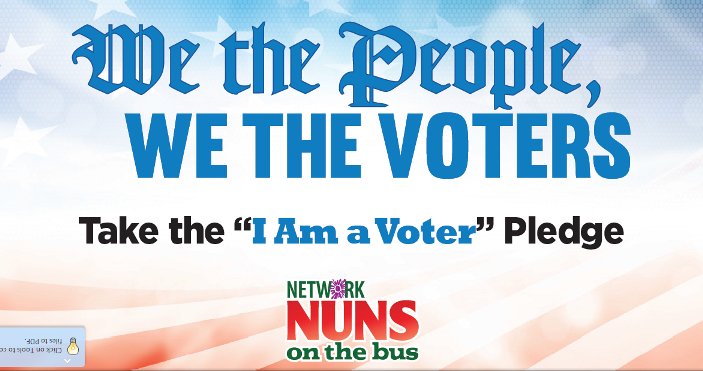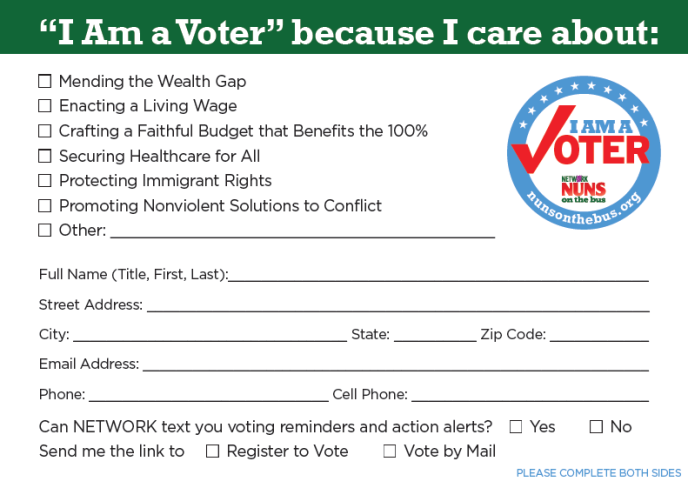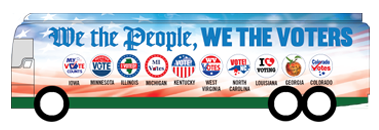Current Nuns on the Bus information can be found at www.nunsonthebus.org.
Ineligible Voters
There are members of all our communities who cannot vote because of age, citizenship status, or criminal record. Don’t underestimate the power of people who cannot vote to motivate, educate, and mobilize your community to become 100% voting.
Everyone living in the U.S. is affected by the decisions our politicians make in Washington, D.C. and our state legislatures, even if they are unable to vote for those politicians. Everyone impacted by the decisions made in our democratic processes must have a voice in politics, even if they cannot vote. Below are suggestions of how to involve and mobilize these groups in your community.
Under 18 According to the US Census, 23.3% of our total population is younger than 18. As young people form their identities, being a voter ought to be an aspect of their identities.
According to the US Census, 23.3% of our total population is younger than 18. As young people form their identities, being a voter ought to be an aspect of their identities.
Involve them in helping your community make good on its 100% voting pledge . Here are some ideas how:
- There are few things more powerful than a child or teen on a mission. Equip them with local information about early voting, absentee voting, and voter registration deadlines. When you ask kids and teens to hold their family members accountable for voting, it can be very effective.
- Consider giving a classroom or youth group a set number of “I Am a Voter” pledge cards to be filled out by people who can vote. Ask the students or youth group members to bring the cards back to receive a prize or a party that celebrates their collective impact. The “I Am a Voter” pledge cards can be ordered in English and Spanish at networklobby.org/pledgecards.
- If your school or faith community has a computer lab or tablets, choose an “open house” day for students or youth group members to help their voting family members come in to register to vote online at networklobby.org/turbovote.
- Older teenagers could babysit so parents can get to the polls.
- Engage young people in conversations about current candidates and their positions to foster future habits of being educated voters when they are of age to vote.
- Youth groups can discuss important issues in your community and hold mock elections as a capstone to those activities.
- When possible, take your children to the polls to experience voting and show your own pride in participating in our electoral system.
Non-citizens/citizenship status
The U.S. has a large immigrant population that includes people who have become citizens, people who are legal permanent residents, people who are here on temporary visas, and people who are undocumented -- due to document expiration or lack of documents. Regardless of documentation status, every immigrant is deeply affected by U.S. policies, including and especially federal immigration policy. New citizens are often some of the most zealous and proud voters you can find to set a good example for your community. Despite non-citizen immigrants’ ineligibility to vote, most non-citizen immigrants’ stories, resilient spirits, and faith witness can be a key source of motivation to help your community or organization to achieve the 100% voting commitment.
 Some things to consider when engaging the immigrant population in your community:
Some things to consider when engaging the immigrant population in your community:
- As you make plans to invite a group to take the “I Am a Voter” pledge, approach members of your immigrant community to see if they would be willing to publicly share testimony about the devastating impacts of politicians’ failure to create public policies that welcome immigrants. Moving peoples' hearts and creating meaning around being a voter who is in solidarity with immigrants will move people toward the voting booth. “I Am a Voter” pledge cards can be ordered in English and Spanish at networklobby.org/pledgecards
- Fully involve members of the immigrant community in any wider conversations about voting; immigrants bring a perspective to the table that is often otherwise is not heard by non-immigrants.
- If possible, recruit immigrant community leaders to have a public role in election conversations. Immigrants can write op eds and letters to the editor. Immigrants can also play key roles in town hall meetings and candidate forums. Immigrant voices will influence public conversations and votes.
-
For non-voting members of the immigrant community who are less inclined to get involved in event planning, public speaking, or writing, there are many other important roles they can be invited to play:
- Few family members have more influence than immigrant grandmas or grandpas. Asking them to commit to exhorting their children, nieces and nephews, and, if they are of age, grandchildren to vote can multiply your impact.
- If your community plans to provide transportation to the polls on Election Day, immigrants with driver's liscences can be recruited to help.
- If your community is offering childcare to enable parents to get to the polls for early voting or on Election Day, immigrants can be recruited to help.
- If community members needs a reason to build enthusiasm and accountability, nothing gathers a community better than food! Consider planning an early voting or Election Day potluck where everyone, including immigrants, can gather and celebrate voting over some delicious home-made foods.

